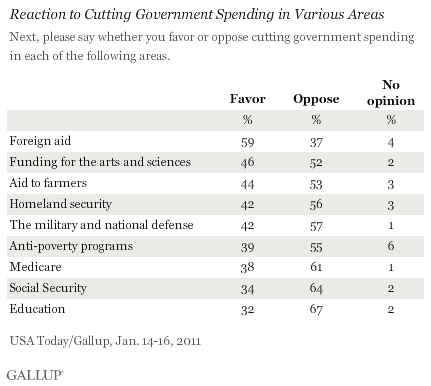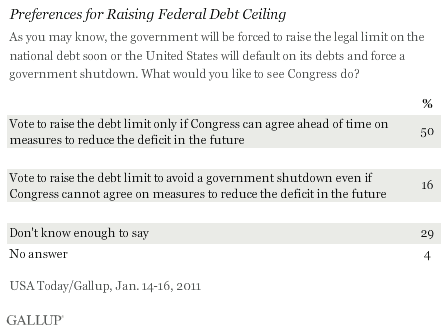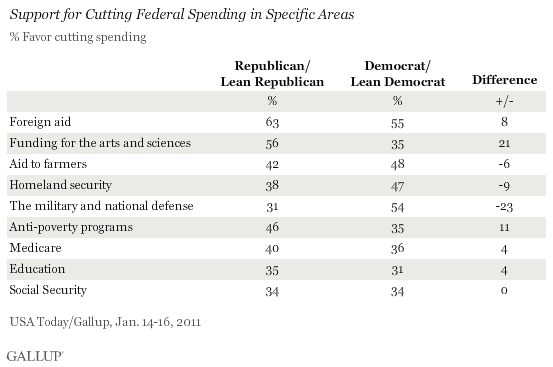PRINCETON, NJ -- Prior to the State of the Union address, a majority of Americans said they favor cutting U.S. foreign aid, but more than 6 in 10 opposed cuts to education, Social Security, and Medicare. Smaller majorities objected to cutting programs for the poor, national defense, homeland security, aid to farmers, and funding for the arts and sciences.

In the weeks ahead, Congress and the White House will likely focus on negotiations over government spending and how to cut the federal budget deficit. In addition to broad concerns about the size of the deficit, Congress is under pressure to raise the legal limit on the national debt before U.S. borrowing exceeds the existing limit -- or face what Treasury Secretary Tim Geithner describes as "catastrophic economic consequences." Geithner's department predicts the current debt ceiling could be exceeded as early as March 31 of this year.
The new Republican leadership in Congress has indicated it will look for progress on deficit reduction before agreeing to raise the federal debt ceiling, and Americans appear to agree with that point in principle. Half of Americans say the limit on the national debt should be raised only if Congress specifies in advance what measures would be taken to reduce the deficit in the future, compared with 16% who think Congress should raise the debt limit regardless. An additional third of Americans have no opinion on the matter.

A thriving national economy can be effective in reducing the federal deficit, because it produces increased revenues even if tax rates remain the same. This happened in the late 1990s during the "dot-com" boom, but few economists are predicting a recurrence of those circumstances in the immediate future. That leaves two practical, but politically painful, approaches to deficit reduction: raising taxes and reducing spending. Americans certainly do not favor an increase in taxes for anyone other than the wealthy, and at this point frown on spending cuts in most of the obvious areas where such reductions could be made.
The largest slices of the current government spending pie, other than interest on the debt, are the entitlement programs and national defense. Entitlement programs are of particular concern, given the looming impact of the aging baby boom generation, the oldest members of which are now turning 65. Despite this, 64% of Americans interviewed in the Jan. 14-16 USA Today/Gallup survey are opposed to cutting government spending for Social Security, and 61% oppose cutting Medicare. Meanwhile, 57% of Americans oppose cutting government spending for national defense. A majority of Americans also oppose cutting education, anti-poverty programs, homeland security, aid to farmers, and funding for the arts and sciences. Foreign aid is the only area out of the nine measured that a majority of Americans agree should be cut.
Two areas of possible cuts generate the biggest differences between Republicans (including independents who lean Republican) and Democrats (including leaners): national defense and funding for the arts and sciences. Democrats are much more in favor of cutting the former, and Republicans, the latter.

Republicans and Democrats differ only minimally in their views on cutting the big-ticket items of Medicare and Social Security. Democrats are slightly more likely to favor cuts in homeland security and aid to farmers, while Republicans are slightly more likely to favor cuts in anti-poverty programs and foreign aid.
Implications
It has become a maxim of U.S. politics that Americans approve of cutting spending in concept but disapprove of cutting specific programs. The Defense Department long ago realized that closing specific military bases is difficult because local politicians always push to keep their area's bases open. This realization led to the creation of a special commission that recommends base closures without directly involving Congress -- an idea that may need to be replicated to achieve broader government spending cuts.
In his State of the Union address Tuesday night, President Barack Obama called for a five-year freeze in most domestic federal discretionary spending, contrasting with Rep. Paul Ryan's Republican response, which emphasized broader and deeper cuts in domestic spending. While Americans may believe, in principle, that the federal government should cut spending, the current data suggest they may be more receptive to Obama's spending freeze, given that Republicans' cuts will inevitably take aim at some programs Americans think ought to be spared.
Survey Methods
Results for this USA Today/Gallup poll are based on telephone interviews conducted Jan. 14-16, 2011, with a random sample of 1,032 adults, aged 18 and older, living in the continental U.S., selected using random-digit-dial sampling.
For results based on the total sample of national adults, one can say with 95% confidence that the maximum margin of sampling error is ±4 percentage points.
For results based on the sample of 516 national adults in Form A and 516 national adults in Form B, the maximum margins of sampling error are ±5 percentage points.
Interviews are conducted with respondents on landline telephones (for respondents with a landline telephone) and cellular phones (for respondents who are cell phone-only). Each sample includes a minimum quota of 150 cell phone-only respondents and 850 landline respondents, with additional minimum quotas among landline respondents for gender within region. Landline respondents are chosen at random within each household on the basis of which member had the most recent birthday.
Samples are weighted by gender, age, race, education, region, and phone lines. Demographic weighting targets are based on the March 2010 Current Population Survey figures for the aged 18 and older non-institutionalized population living in continental U.S. telephone households. All reported margins of sampling error include the computed design effects for weighting and sample design.
In addition to sampling error, question wording and practical difficulties in conducting surveys can introduce error or bias into the findings of public opinion polls.
View methodology, full question results, and trend data.
For more details on Gallup's polling methodology, visit www.gallup.com.
